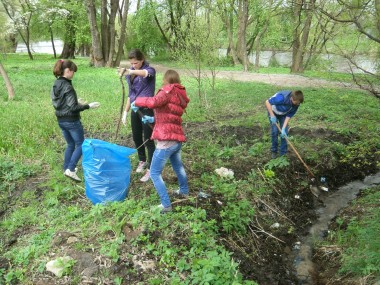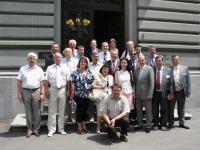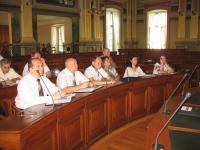Berne-Kyiv, June 28-July 3: A UNDP-led Project "Municipal Governance and Sustainable Development Programme" (UNDP/MGSDP) with support from Swiss Resource Center and Consultancies for Development (SKAT) has organised a study tour for Ukrainian top local decision-makers. The participants learned the best practices of functioning of local self-government as well as benefits of decentralization with clear separation of functions, responsibilities and authorities of central and local governments. The visit was held with financial support from the Swiss Confederation.
The study tour [June 28-July 3] was aimed at exposing top local decision-makers to the best practice of people-centered democracy at all levels and show the benefits of decentralization.
During first part of the visit the guests learned the public administration system of the Swiss Confederation, in particular the success of decentralisation in Switzerland, the role of local government in the state, types of services provided to population by local government. The participants discovered that Swiss system is based on the principles of concordat, when decisions are taken upon consensus, direct democracy and federalism.
The participants visited six Swiss municipalities - Berne, Zurich, Rapperswill, Weinfelden, St-Gallen, Appenzell and met the representatives of municipal administrations and sectoral departments. These municipalities were selected to share their best experience in areas of energy efficiency, solid waste management, housing sector, municipal economy, environmental issues, youth policy and local finance.
Special emphasis during the discussions was put on mechanism of regular voting and referendums at state and local levels in Switzerland which is the exemplary case to be followed for ensuring the maximum support for governmental decisions. Such referendums ensure that decisions made on development issues should be unconditionally implemented no matter which political force is in power after the elections. Based on this practice, Ukrainian local decision-makers decided to raise the level of citizens engagement into the decision-making process for approval of local regulatory acts on city development.
Efforts of the Swiss Confederation and its municipalities in terms of energy efficiency are worth mentioning. The state has sufficient financial resources, but at the same time has the high level of understanding that reduction of resource consumption is needed to protect environment, and, therefore, develops and implements various programmes to create the 2000-Watt-Society. The 2000-Watt-Society is a vision, originated by the Swiss Federal Institute of Technology in Zürich at the end of 1998, in which each person would cut their over-all rate of energy use to an average of no more than 2,000 watts (i.e. 17,520 kilowatt-hours per year of all energy use, not only electrical) by the year 2050, without lowering their standard of living.
The knowledge that Ukrainian officials got in the Swiss Confederation is seen as extremely helpful to the participants. Valentyn Synytsky, Mayor of Dzhankoy municipality said, “Ukrainian Mayors can apply experience of Swiss municipalities in their work, in particular project approach to city management, developing long-term energy-saving programme (e.g. 2000-Watt-Society), transfer of the enterprises of municipal infrastructure into concession. Also, Ukraine can apply Swiss experience in educating population on energy-saving and municipalities can introduce the elements of the referendum into the operation of the city councils through mailed questioners and surveys at official web-site of the city council”.
The participants of the visit included Olena Lytvynenko, SDC Programme Officer; Bogdan Bilyk, Head of Department of Socio-Economic Development and European Integration of Ivano-Frankivsk municipality, Chairperson of the National Forum of Partner Municipalities in 2010; Yuriy Gerzhov, Mayor of Voznesensk municipality; Mykola Borovets, Mayor of Novograd-Volynskiy municipality; Viktor Mandrus, Mayor of Kirovske Municipality; Valeriy Vesnyanyy, Mayor of Tulchyn municipality; Anatoliy Busenkov, Mayor of Rubizhne municipality; Oleg Klyuy, Mayor of Saky municipality; Valentyn Synytsky, Mayor of Dzhankoy municipality; Volodymyr Chayka, Mayor of Mykolayiv municipality; Volodymyr Garazd, Mayor of Dolyna municipality; Oleh Berezyuk, Head of Lviv City Administration; Ms. Skaliy Iryna, Project Manager, UNDP/MGSDP; Ms. Olena Ursu, Governance and Sustainable Development Expert, UNDP/MGSDP; Aider Seyitosmanov, Governance Adviser of UNDP Project “Crimea Integration and Development Programme”; Oksana Garnets, DesPro Senior Project Coordinator; Andriy Gyzhko, Head of the Chief Department of Economics of Vinnitsya Oblast Administration; Zamir Khaybullaev, Deputy Head of Bakhchysaray Rayon Council.
For further information, please, contact Galyna Smirnova, Monitoring and Communications Officer of UNDP/MGSDP, by tel. (+38044) 253 5068 or via e-mail: galyna.smirnova at undp.org.ua



















